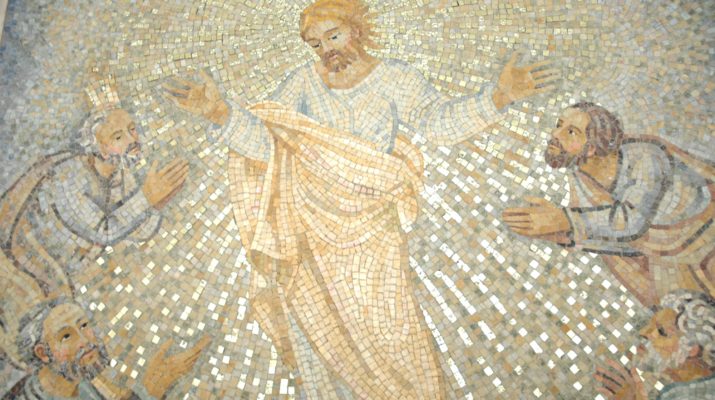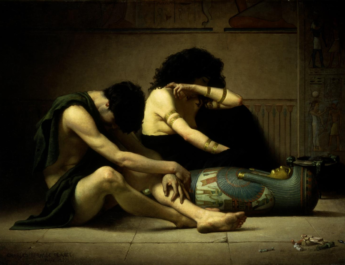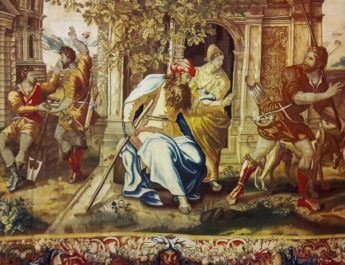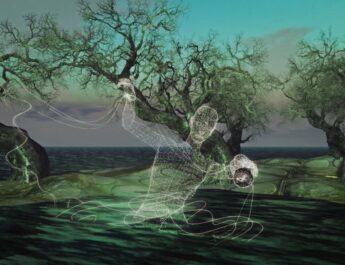Matthew 17:1-9
Transfiguration of the Lord A
1 Six days later, JesusI took with him PeterIII and JamesIII
I “Jesus” = Iesous. From Hebrew Yehoshua (Joshua, the Lord is salvation); {from YHVH (proper name of the God of Israel; the self-existent and eternal one); {from havah (to become) or from hayah (to come to pass, become, be)} + yasha (to deliver, defend, help, preserve, rescue; properly, to be open, wide or free, which implies being safe. So, in a causative sense, this is to free someone). This is Jesus or Joshua in Greek – the Lord saves or the Lord is salvation.
II “Peter” = Petros. Related to petra (large rock that is connected and or projecting like a rock, ledge, or cliff; can also be cave or stony ground). This is Peter, a stone, pebble, or boulder.
III “James” = Iakobos. From Hebrew Yaaqov (Jacob); from the same as aqeb (heel, hind part, hoof, rear guard of an army, one who lies in wait, usurper). This is James, meaning heel grabber or usurper.
and his brotherIV JohnV and ledVI them up a highVII mountain, by themselves.VIII
IV “brother” = adelphos. From a (with, community, fellowship) + delphus (womb). This is a brother in a literal or figurative sense. It is also used of another member of the Church.
V “John” = Ioannes. Related to “Jesus” in v1. From Hebrew yochanan (Johanan); from Yehochanan (“the Lord has been gracious”); {from YHVH (see note I above) + chanan (beseech, show favor, be gracious; properly, to bend in kindness to someone with less status). This is John.
VI “led” = anaphero. 10x in NT. From ana (up, back, among, again, anew) + phero (to bear, bring, lead, make known publicly; to carry in a literal or figurative sense). This is to carry or lead up as to a goal or particular destination. It can also be used for offering a sacrifice.
VII “high” = hupselos. 12x in NT– in Matthew’s and Luke’s Temptatison story as well as Matthew and Mark’s Transfiguration accounts. From hupsos (height, high position, heaven, dignity, eminence; elevation, altitude; to be exalted); from hupsi (on high, aloft); from huper (over, above, beyond). This is high, lofty, or exalted. It can be lofty in elevation or in character.
VIII “themselves” = idios. This is something that belongs to you or that is personal, private, apart. It indicates a stronger sense of possession than a simple possessive pronoun. This is where “idiot” comes from (denoting someone who hasn’t had formal training or education and so they rely on their own understanding).
2 And he was transfiguredIX before them, and his faceX shoneXI like the sun,XII
IX “transfigured” = metamorphoo. 4x in NT. From meta (with among, behind, beyond; implies a change following contact or action) + morpho (to form, mold, shape; coming into the shape that signified inner essence) {from morphe (form, shape, external appearance; an appearance that embodies inner essence; figuratively, the nature of something); {perhaps from meros (a part or share, portion); {from meiromai (to get one’s allotment or portion)}. This is to transform or change. It is the root that “metamorphosis” comes from.
X “face” = prosopon. From pros (at, towards, with) + ops (eye, face) {from optanomai (to appear, be seen); perhaps from horao (become, seem, appear)}. This is the face, surface, or front. It can imply presence more generally.
XI “shone” = lampoo. 7x in NT. This is to shine or beam in a literal or figurative sense. This is the root that the word “lamp” comes from.
XII “sun” = helios. This is sun, which would imply light in general or the east.
and his clothesXIII becameXIV dazzlingXV white.XVI
XIII “clothes” = himatia. From heima (garment) OR from ennumi (to put on). This is the outer garment, cloak, robe, or mantle. It is worn loosely over a tunic.
XIV “became” = ginomai. This is to come into being, to happen, become, be born; to emerge from one state or condition to another. This is coming into being with the sense of movement or growth.
XV “dazzling” = hos + ho + phos. Literally “as the light.” Phos is from phao (to shine or make visible, especially with rays of light); from the same as phaino (to bring light, cause to appear, shine, become visible or clear). This is light, a source of light, fire, or radiance. This is light with specific reference to what it reveals. It is luminousness whether natural or artificial, abstract or concrete, literal or figurative.
XVI “white” = leukos. Related to luke (light). This is bright, white, or brilliant.
3 SuddenlyXVII there appearedXVIII to them MosesXIX and Elijah,XX talking with him.
XVII “suddenly” = idou. From eido (to be aware, see, know, remember, appreciate). This is see! Lo! Behold! Look! Used to express surprise and or draw attention to the statement.
XVIII “appeared” = horao. Related to “face” in v2. See note X above. To see, perceive, attend to, look upon, experience. Properly, to stare at and so implying clear discernment. This, by extension, would indicate attending to what was seen and learned. This is to see, often with a metaphorical sense. Can include inward spiritual seeing.
XIX “Moses” = Mouses. From Hebrew Mosheh (Moses); from mashah (to pull out in a literal or figurative sense, to draw out) OR from Egyptian mes or mesu (child, son i.e. child of…). This is Moses – the one drawn out from the water, which is to say, rescued. If derived from the Egyptian, his name would share a root with Rameses and Thutmose.
XX “Elijah” = Elias. Related to “Jesus” and “John” in v1. From Hebrew Eliyyah (Elijah) {from el (God, god) + Yah (the shortened form of the name of the God of Israel; God, Lord); {from YHVH (see note I above)}. This is Elijah, “The Lord is God.”
4 Then Peter said to Jesus, “Lord,XXI it is goodXXII for us to be here; if you wish,XXIII I will make three dwellingsXXIV here, one for you, one for Moses, and one for Elijah.”
XXI “Lord” = kurios. From kuros (authority, supremacy). This is a respectful address meaning master or sir. It refers to one who has control or power greater than one’s own. So, it was also applied to God and Jesus as Master or Lord.
XXII “good” = kalos. This is good, noble, beautiful, correct, or worthy. This is external signs of goodness like beauty, demonstrations of honorable character, showing moral virtues. A different word, agathos, speaks of intrinsic good.
XXIII “wish” = thelo. This is to wish, desire, will, or intend. It is to choose or prefer in a literal or figurative sense. It can also mean inclined toward or take delight in. It can have a sense of being ready to act on the impulse in question.
XXIV “dwellings” = skene. Perhaps related to skeuos (vessel, tool, container, implement; also vessel in a figurative or literal sense) or perhaps related to skia (shadow, thick darkness, outline; figurative for a spiritual situation that is good or bad). This is a tent, booth, tabernacle, or dwelling. It could be a cloth hut. This is a tent in a literal or figurative sense.
5 While he was still speaking, suddenly a brightXXV cloudXXVI overshadowedXXVII them, andXXVIII from the cloud a voiceXXIX said,
XXV “bright” = photeinos. Related to “dazzling” in v2. 5x in NT. From phos (see note XV above) OR from phao (see note XV above). This is full of light, shining, brilliant, transparent, or well-illumined.
XXVI “cloud” = nephele. From nephos (cloud; figurative for a great crowd or multitude). This is cloud or cloudiness.
XXVII “overshadowed” = episkiazo. Perhaps related to “dwellings” in v4. 5x in NT – 3x in Transfiguration accounts, 1x when the angel tells Mary she will become pregnant, and 1x in Acts when people are healed when Peter’s shadow falls on them. From epi (on, upon, what is fitting) + skia (see note XXIV above). This is to overshadow or envelop. It could also mean to capture something in a bright haze or figuratively to influence something with a supernatural force or presence.
XXVIII {untranslated} = idou. Same as “suddenly” in v3. See note XVII above.
XXIX “voice” = phone. Related to “dazzling” in v2 & “bright” in v5. Probably from phemi (to declare, say, use contrasts in speaking to shed light on one point of view); {from phao (see note XV above) or phaino (see note XV above). This is a voice, sound, tone or noise. It can also be a language or dialect.
“This is my Son, the Beloved;XXX with him I am well pleased;XXXI listenXXXII to him!”
XXX “Beloved” = agapetos. From agape (love, goodwill, benevolence; God’s divine love); from agapao (to love, take pleasure in, esteem; to prefer). This is Beloved or very dear one. It is a title for the Messiah, but also for Christians. Properly, this is one who personally experiences God’s love.
XXXI “am well pleased” = eudokeo. From eu (good, well, well done) + dokeo (to have an opinion, seem, appear, suppose; a personal judgment; to think); from dokos (opinion). This is to think well of, to be pleased or resolved. Properly, this is what someone finds good or acceptable – approving of some action or generally thinking well of.
XXXII “listen” = akouo. This is hear or listen, but it also means to understand by hearing. This is where the word “acoustics” comes from.
6 When the disciplesXXXIII heard this, they fell to the groundXXXIV and were overcome by fear.XXXV
XXXIII “disciples” = mathetes. From matheteuo (to make a disciple of); from manthano (to learn key facts, gain knowledge from experience; generally implies reflection as part of the learning process); from math– (thinking things through). This is a disciple, learner, or student. It is where we get “mathematics” from.
XXXIV “fell to the ground” = pipto + epi + prosopon + autos. Literally, “fell on their face.” Prosopon is from pros (at, towards, with) + ops (eye, face) {from optanomai (to appear, be seen); perhaps from horao (become, seem, appear)}. This is the face, surface, or front. It can imply presence more generally.
XXXV “overcome by fear” = phobeo. From phobos (panic flight, fear, fear being caused, terror, alarm, that which causes fear, reverence, respect); from phebomai (to flee, withdraw, be put to flight). This is also to put to flight, terrify, frighten, dread, reverence, to withdraw or avoid. It is sometimes used in a positive sense to mean the fear of the Lord, echoing Old Testament language. More commonly, it is fear of following God’s path. This is where the word phobia comes from.
7 But Jesus came and touchedXXXVI them, saying, “Get upXXXVII and do not be afraid.” 8 And when they looked up,XXXVIII they sawXXXIX no one except Jesus himself alone.
XXXVI “touched” = haptomai. From hapto (to touch, handle, kindle, lay hold of). This is a touch that has an impact on what is being touched – it has an influence on the recipient so that the recipient is changed.
XXXVII “get up” = egeiro. This is to awake, raise up or lift up. It can be to get up from sitting or lying down, to get up from sleeping, to rise from a disease or from death. Figuratively, it can be rising from inactivity or from ruins.
XXXVIII “looked up” = epairo. Literally “and having lifted up their eyes.” 19x in NT. From epi (on, upon, among, what is fitting) + airo (raise, take up, lift, remove). This is to lift up or raise in a literal or figurative sense. Figuratively, it could mean to exalt oneself.
XXXIX “saw” = horao. Same as “appeared” in v3. See note XVIII above.
9 As they were coming down the mountain, Jesus orderedXL them, “Tell no one about the visionXLI until after the Son of ManXLII has been raisedXLIII from the dead.”XLIV
XL “ordered” = entellomai. 15x in NT. From en (in, on, at, by, with) + tellomai (to accomplish) {from telos (an end, aim, purpose, completion, end goal, consummation, tax; going through the steps to complete a stage or phase and then moving on to the next one)}. This is to charge, command, give orders or instructions.
XLI “vision” = horama. Related to “face” in v2 & “appeared” in v3. 12x in NT. From horao (see note XVIII above). This is vision, spectacle, or sight. It can also be spiritual seeing – especially a supernatural vision.
XLII “Man” = anthropos. Probably from aner (man, male, husband) + ops (eye, face). This is human, humankind. Used for all genders.
XLIII “raised” = egeiro. Same as “get up” in v7. See note XXXVII above.
XLIV “dead” = nekros. Perhaps from nekus (corpse). This is dead of lifeless, mortal, corpse. It can also be used figuratively for powerless or ineffective. It is where the word “necrotic” comes from.
Image credit: “Transfiguration” at the Basilica di San Pietro in Vatican City Rome.




